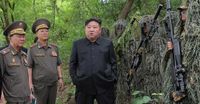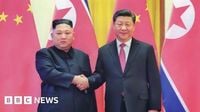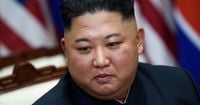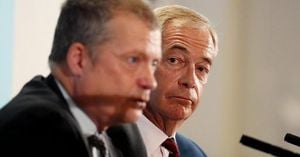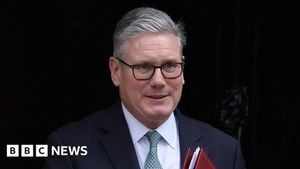North Korean leader Kim Jong Un is set to make his first visit to China in six years, joining Chinese President Xi Jinping and Russian President Vladimir Putin at a landmark military parade in Beijing on September 3, 2025. The event, which commemorates the 80th anniversary of the end of World War II and China's resistance against Japanese aggression, marks Kim's most significant international appearance since taking power in 2011—and his first participation in a multilateral summit with other heads of state.
According to North Korea's official Korean Central News Agency and China's state-run Xinhua News Agency, Kim will attend the parade at the invitation of Xi Jinping. The Chinese Foreign Ministry reinforced the significance of the occasion at a press conference, with assistant minister Hong Lei declaring, "We warmly welcome General Secretary Kim Jong Un to China to attend the commemorative events. Upholding, consolidating and developing the traditional friendship between China and the DPRK is a firm position of the Communist Party of China and the Chinese government."
The parade, which will take place in Beijing's historic Tiananmen Square, is expected to feature tens of thousands of Chinese military personnel, including troops from 45 echelons, as well as veterans of past conflicts. Observers anticipate a grand display of China's latest military technology, including hundreds of aircraft, tanks, and advanced anti-drone systems. In a notable first, the event will showcase the new structure of the Chinese armed forces in a highly choreographed 70-minute spectacle, capped by a speech from Xi Jinping.
Kim's attendance is a diplomatic coup for Beijing, signaling China's enduring influence over its reclusive neighbor at a time of shifting alliances and global tension. As the BBC reported, this is the first time a North Korean leader has attended a Chinese military parade since 1959. For Xi, the presence of both Kim and Putin at the event underscores his role as a regional power broker, especially as Western leaders largely shun the parade in protest over Russia's ongoing war in Ukraine.
Indeed, the guest list for the parade highlights the evolving global order. Heads of state and government from 26 countries will be present, including leaders from Iran, Belarus, Serbia, Cuba, Indonesia, Myanmar, Pakistan, and Malaysia. Notably absent are leaders from the United States and major Western European nations, reflecting deepening divisions with Moscow and Beijing over the Ukraine conflict. According to Reuters, the only European Union leader set to attend is Slovak Prime Minister Robert Fico, while other EU countries are sending lower-level representatives or skipping the event entirely.
North Korea's relationship with China is both historic and vital. As NBC News explained, China accounts for about 97–98% of North Korea's external trade, making Beijing an economic lifeline for Pyongyang. Despite this, ties have been strained in recent years by North Korea's growing cooperation with Russia. Kim has supplied artillery, weapons, and even troops to support Moscow's war in Ukraine, reportedly in exchange for economic and military assistance. Experts believe that Russia may be providing North Korea with advanced military technology, potentially boosting Kim's nuclear and missile programs.
Yang Moo-jin, president of the University of North Korean Studies in Seoul, told NBC News, "North Korea is seeking to strengthen ties with China following its moves with Russia, thereby showcasing socialist solidarity among North Korea, China and Russia." This parade, then, is more than a celebration of history—it is a stage for the display of renewed alliances and strategic maneuvering.
Kim's international travels have been rare. Since inheriting power in December 2011, he has met world leaders—including Xi Jinping, Vladimir Putin, former U.S. President Donald Trump, and former South Korean President Moon Jae-in—but always in bilateral settings. His last visit to China was in 2019, following three trips in 2018. The COVID-19 pandemic and international sanctions have further isolated Kim, making this return to Beijing particularly significant. As NK News noted, Kim's attendance is an upgrade from China's previous Victory Day parade in 2015, when North Korea was represented only by a senior official.
For China, the parade is a chance to reaffirm its role as North Korea's primary ally and to project strength both domestically and internationally. During a press briefing, Beijing praised the "decades-long traditional friendship" with Pyongyang and pledged continued collaboration on "regional peace and stability." Hong Lei, director-general of the Chinese Foreign Ministry's Department of Protocol, highlighted the shared sacrifices of both nations during World War II, stating, "During the arduous years of war, the peoples of China and North Korea supported each other and fought side by side against Japanese aggression, making important contributions to the victory of the global anti-fascist war and the cause of human justice."
Meanwhile, the absence of Western leaders is a stark reminder of the current geopolitical rift. The United States and its allies have declined invitations, in part due to Putin's presence and his outstanding arrest warrant from the International Criminal Court over alleged war crimes in Ukraine. China has not criticized Russia's actions and has been accused by the U.S. and its partners of aiding Moscow—a charge Beijing denies.
Kim's participation also comes amid speculation about the future of North Korea's diplomacy with the United States. Former President Donald Trump, who met Kim three times between 2018 and 2019, has recently expressed interest in reviving denuclearization talks. During a meeting with South Korean President Lee Jae Myung in Washington this week, Trump reminisced about his historic walk across the Korean Demilitarized Zone, telling reporters, "I loved it. Remember when I walked across the line and everyone went crazy." However, North Korea has so far rebuffed Trump's outreach, insisting that any future negotiations must recognize its status as a nuclear power.
Kim's visit to Beijing may be a strategic move to strengthen his position ahead of any potential diplomatic overtures. Leif-Eric Easley, professor of international studies at Ewha Womans University in Seoul, told the Associated Press, "Pyongyang’s illicit cooperation with Moscow has strained ties with Beijing, even as China’s political and economic support remains vital for the North Korean regime. To re-engage Trump from a position of strength, Kim seeks to repair relations with Xi, and attending the parade in Beijing is a highly visible way of doing that."
The parade also serves as a platform for China to demonstrate its rising influence in the region. Leaders from Southeast Asia, including Indonesia and Malaysia, will be in attendance—evidence of Beijing's efforts to deepen ties with its neighbors. Myanmar's military ruler, Min Aung Hlaing, another international outcast, will also be present, underscoring China's willingness to engage with governments shunned by the West.
As the world watches, the September 3 parade in Beijing will be more than a commemoration of victory over fascism. It is a vivid tableau of shifting alliances, strategic calculations, and the enduring complexities of international diplomacy. With Kim, Putin, and Xi standing together on the global stage, the event will offer a rare glimpse into the evolving balance of power in East Asia—and perhaps, a preview of the diplomatic battles yet to come.
